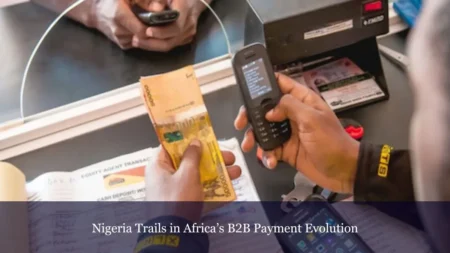- Visualising the state of debt in Africa 2024
- Abu Dhabi radiates optimism as over 300 startups join AIM Congress 2024
- TLcom Capital Raises $154 million in Funding to Boost Its African Growth
- Africa’s $824Bn debt, resource-backed opaque loans slowing growth — AfDB
- LB Investment brings $1.2 trillion portfolio display to AIM Congress spotlight
- AmCham Summit kicks off, setting course for robust future of US-East Africa trade ties
- Why the UN is raising the red flag on the UK-Rwanda asylum treaty
- Portugal’s Galp Energia projects 10 billion barrels in Namibia’s new oil find
Browsing: data on Fintech in Africa
- Nigeria received $1.2 billion in 2022 to fund and support fintech-based startups.
- South Africa led in electronic bank transfers, with 49.1% of respondents selecting their preferred payment methods.
- Kenya took the lead on the best payment automation stem, with 83.4% stating that their B2B payment systems were semi-automatic or fully automatic.
Within the past decade, the world economy has revolutionized into a more digital era. The technological progress of the continent is attributed to the rising technologies, ushering in the fourth industrial revolution. Among these emerging markets is Africa’s fastest and most lucrative economic activity; Fintech.
Africa’s fintech industry has grown exponentially over the past two decades. The endeavours of entrepreneurs and innovators have fueled a new approach to traditional financial systems. Essentially, it has ushered in a new B2B payment system that is reliable, scalable, available and faster.
This new trend met high enthusiasm from several countries within the …
- The use of digital solutions is revolutionizing all kinds of financial transactions from making simple payments to borrowing and lending.
- With mobile phone and internet penetration rising at a phenomenal phase, even the remotest parts of Africa can now access financial services through their mobile phones.
- The World Bank: It is time for policymakers to embrace fintech opportunities and implement policies that enable and encourage safe financial innovation and adoption.
Financial technology or the application of digital tools to streamline financial services more commonly known in the short form Fintech, is reshaping the future of financial services and creating a boom for investors in the fast-growing segment.
The use of digital solutions is revolutionizing all kinds of financial transactions from making simple payments to borrowing and lending. Be it your next investment portfolio or your insurance, you name it, almost any financial service you can think of can now be …
- The fintech industry is Africa’s financial inclusion solution for all vulnerable groups including women.
- Sub-Sahara Africa, fintech startups recorded 894% year-on-year growth in funding in 2021
- More than 400 million new mobile subscribers expected to sign up globally by 2025
A report published by McKinsey claims that the number of tech start-ups in Africa tripled to around 5,200 companies between 2020 and 2021 and just under half of these are fintech startups.
In the report titled ‘Fintech in Africa:The end of the beginning’ McKinsey shows that in line with global market leaders, the African fintech industry enjoyed revenues of between US$4 billion and US$6 billion in 2020 and average penetration levels of between 3 and 5 percent.
The fintech industry is Africa’s financial inclusion solution for all vulnerable groups including women, the elderly, and the larger section of the population in remote rural settings.
“What you have here is not …
- McKinsey report found that fintech in Africa is the fastest-growing startup industry, raising over US$1.3 billion in 2021
- The industry is being supported by several trends, including smartphone ownership, declining internet costs, and a young, fast-growing, and rapidly urbanising population
- Cash is still used in around 90% of transactions in Africa, which means that fintech revenues have huge potential to grow
- The top challenges that fintech may face include reaching scale and profitability, navigating an uncertain regulatory environment, managing scarcity, and building robust corporate governance foundations
A new finding named fintech in Africa as the fastest-growing startup industry, raising over US$1.3 billion in 2021.
McKinsey & Company found that the industry is being supported by several trends, including smartphone ownership, declining internet costs, expanded network coverage, and a young, fast-growing, and rapidly urbanizing population. Further, the COVID-19 pandemic has also accelerated existing trends toward digitalization and created a fertile environment …








